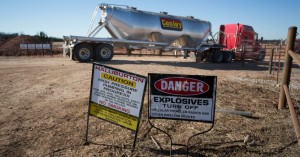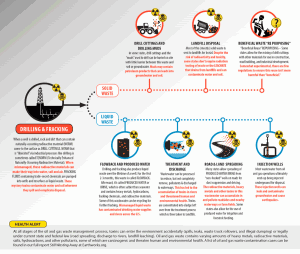From an Article by Jessica Corbett, Common Dreams, June 18, 2019
Detailing decades of EPA’s mismanagement of toxic fossil fuel waste, researchers demand immediate action to stem assault on people and planet!
For more than three decades, the U.S. government has mismanaged toxic oil and gas waste containing carcinogens, heavy metals, and radioactive materials, according to a new Earthworks report—and with the country on track to continue drilling and fracking for fossil fuels, the advocacy group warns of growing threats to the planet and public health.
“Even if we stop all new drilling and fracking immediately, the flood of toxic waste streams will continue to grow for decades,” Melissa Troutman, the report’s lead author, said in a statement Tuesday. “In spite of industry claims of innovation, the risks from oil and gas waste are getting worse, not better.”
Building on a 2015 Earthworks analysis, Still Wasting Away (pdf) details congressional and Environmental Protection Agency (EPA) actions as well as industry lobbying related to the federal rules for liquid and solid waste from fossil fuel development.
“Despite over 30 years of research about the toxic impacts of the industry’s waste, it is far from being handled properly,” the report says. “There is little consistency in tracking, testing, and monitoring requirements for oil and gas waste in the United States.”
“At all stages of the oil and gas waste management process,” the report explains, “toxins can enter the environment accidentally (spills, leaks, waste truck rollovers, and illegal dumping) or legally under current state and federal law (road spreading, discharge to rivers, landfill leaching).”
Demonstrating the scope of the threat that such waste poses to human health, the report notes that “an estimated 17.6 million Americans live within a mile of oil and gas development, including half of the population in West Virginia and almost a quarter of the population in Ohio.”
The report calls for immediate action from state and federal governments, and offers several policy recommendations to stem mounting risks to water, soil, air, and people nationwide.
Still Wasting Away features a timeline that tracks federal action on fossil fuel waste management and industry lobbying all the way back to 1976, when Congress enacted the Resource Conservation & Recovery Act (RCRA) that required the EPA to craft rules to identify and manage hazardous waste.
The EPA spent the next few years writing regulations—and fossil fuel lobbyists reportedly got to work trying to influence the agency, which issued a key final decision on industry waste in 1988.
As Earthworks senior policy counsel Aaron Mintzes put it, “Industry lobbyists secured a ‘special’ designation for oil and gas wastes that exempt it from our national hazardous waste safeguards.” Mintzes added that “oil and gas waste is indeed ‘special,’ it is especially toxic, but that means it should require more oversight, not less.”
In 2016, Earthworks and other environmental organizations filed a federal lawsuit against the EPA in a bid to force the agency to more strictly manage fossil fuel waste under the RCRA, and the EPA agreed to a consent decree that required the agency to review and consider revising its rules. In April, the EPA announced that it wasn’t making any changes and that it would allow states to continue spearheading regulation.
“EPA will continue to work with states and other organizations to identify areas for continued improvement and to address emerging issues to ensure that exploration, development, and production wastes continue to be managed in a manner that is protective of human health and the environment,” the EPA vowed on its website.
With the release of Still Wasting Away, Earthworks charged Tuesday that “this report, and others, reveal that EPA and state governments are leaving communities at increased risk for exposure to toxic and carcinogenic oil and gas waste.”
While the Earthworks report details waste management failures under both Democratic and Republican presidents, environmental advocates face an uphill battle in their fight for stricter federal rules under the Trump administration. According to a New York Times tally updated earlier this month, the administration—with help from congressional Republicans—has worked to roll back at least 83 environmental regulations since President Donald Trump took office.
Still Wasting Away will be followed by supplemental reports for nine states that are home to much of the country’s drilling and fracking for fossil fuels: California, Colorado, New Mexico, New York, North Dakota, Ohio, Pennsylvania, Texas, and West Virginia.



{ 1 comment… read it below or add one }
Dear Friends,
The Trump administration wants to open land near Yosemite and Sequoia National Parks to a massive expansion of fracking. People who live in communities impacted by fracking have reported being able to light their tap water on fire. And the methane pollution that fracking causes is driving climate chaos.
Now, Trump is trying to expand fracking even more by making it easier to transport fracked gas through our communities. His administration wants to allow highly explosive fracked gas to be transported by rail.
This is a catastrophic accident waiting to happen. But we can still stop it. The administration is required to consider public input before moving forward — but the comment period closes on Monday. So we need you to speak up NOW!
Add your comment: Say NO to transporting highly explosive fracked gas by rail!
Fracked gas is far too dangerous to be transported by train. Just look at what happened in Durham, North Carolina this April. A gas leak led to officials being forced to evacuate a nearby building. But while they were evacuating, there was a massive explosion. One person died and more than a dozen others were injured.
Now, imagine that accident hadn’t happened in a building — but on train tracks cutting through New York, Pennsylvania, New England and beyond. This would be an unacceptable risk to people’s safety.
On top of the safety risks, if we want to avert the worst impacts of climate chaos, we can’t keep fracking. Instead, we need to rapidly transition away from all fossil fuels. Our leaders should be making it harder — not easier — to build fracked gas infrastructure.
Tell the Pipeline and Hazardous Materials Safety Administration: No fracked gas on trains!
All across the country, people are standing up to the fossil fuel industry’s destruction. States from Maryland to Florida have banned or are considering banning fracking altogether due to the environmental harm it causes.
These communities are sending a strong message: No one wants to live with poisoned water, man-made earthquakes, or an unlivable climate. But the Trump administration is still putting Big Polluters’ profits first. We can’t let that happen.
Help send 30,000 comments before the Monday deadline: Say NO to fracked gas trains!
Standing with you, Nicole Ghio,
Senior fossil fuels program manager,
Friends of the Earth
Contact Form — https://action.foe.org/page/11801/action/1?locale=en-US